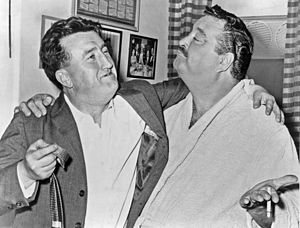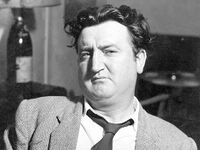Brendan Behan
Relevance
From A Piece Of His Mind - Morrissey Interview / Hotpress:
HOT PRESS: A song on World Peace Is None Of Your Business that will definitely resonate with Irish fans is ‘Mountjoy’. What are your impressions of the place?
MORRISSEY: The name is so perverse considering what it does to people. It doesn’t sound like what it is, whereas they knew exactly what they were doing when they named Strangeways prison in Manchester. With Mountjoy, well, the name’s so ridiculous, isn’t it? It’s a bit like calling the local maternity hospital St. Killmore’s.Brendan Behan gets a namecheck on it. What’s your favourite work of his?
You can’t go wrong in choosing anything, and I love people who dodge all the gender-imperative rubbish that society torments us all with. I love the fact that he didn’t think that heterosexuality resolved anything at all, meaning, I assume, that he didn’t think it was enough just to be heterosexual. You read him and you are immediately convinced that the rest of the world is suffering a mass mental illness. I love writers like that.
His image was used as part of the 2014 tour backdrops.
Wikipedia Information
 |
Brendan Francis Aidan Behan (christened Francis Behan) ( BEE-ən; Irish: Breandán Ó Beacháin; 9 February 1923 – 20 March 1964) was an Irish poet, short story writer, novelist, playwright, and Irish Republican, an activist who wrote in both English and Irish. His widely acknowledged alcohol dependence, despite attempts to treat it, impacted his creative capacities and contributed to health and social problems which curtailed his artistic output and finally his life. In 2023 reports emerged of his allegedly sexually violent behaviour against a young New York publicist, Letty Cottin Pogrebin in the early 1960s.An Irish Republican and a volunteer in the Irish Republican Army, Behan was born in Dublin into a staunchly republican family, becoming a member of the IRA's youth organization Fianna Éireann at the age of fourteen. There was also a strong emphasis on Irish history and culture in his home, which meant he was steeped in literature and patriotic ballads from an early age. At age 16, Behan joined the IRA, which led to his serving time in a borstal youth prison in the United Kingdom and imprisonment in Ireland. During this time, he took it upon himself to study, and he became a fluent speaker of the Irish language. Subsequently released from prison as part of a general amnesty given by the Fianna Fáil government in 1946, Behan moved between homes in Dublin, Kerry and Connemara and also resided in Paris for a time. In 1954, Behan's first play, The Quare Fellow, was produced in Dublin. It was well received; however, it was the 1956 production at Joan Littlewood's Theatre Workshop in Stratford, London, that gained Behan a wider reputation. This was helped by a famous drunken interview on BBC television with Malcolm Muggeridge. In 1958, Behan's play in the Irish language, An Giall had its debut at Dublin's Damer Theatre. Later, The Hostage, Behan's English-language adaptation of An Giall, met with great success internationally. Behan's autobiographical novel, Borstal Boy, was published the same year and became a worldwide best-seller. By the early 1960s, Behan reached the peak of his fame. He spent increasing amounts of time in New York City, famously declaring, "To America, my new found land: The man that hates you hates the human race." By this point, Behan began spending time with various prominent people such as Harpo Marx and Arthur Miller and was followed by a young Bob Dylan. However, this newfound fame did nothing to aid his health or his work, with his alcohol dependence and diabetic conditions continuing to deteriorate. Brendan Behan's New York and Confessions of an Irish Rebel received little praise. He briefly attempted to combat this by a dry stretch while staying at the Chelsea Hotel in New York, and in 1961 was admitted to Sunnyside Private Hospital, an institution for the treatment of alcohol dependence in Toronto, but he once again turned back to alcohol and relapsed back into active alcohol use.
